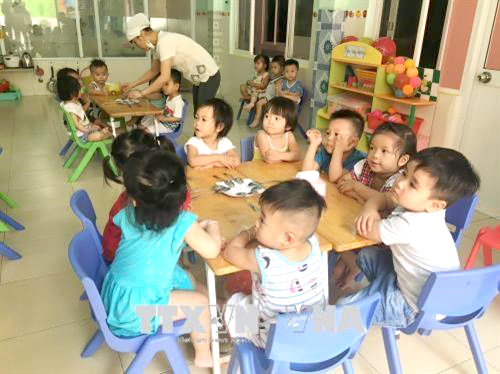 Society
Society


|
| A kindergarten in HCM City. VNA/VNS Photo Thu Hoài |
HCM CITY — HCM City has increased its budget allocation for preschool education and has called on the private sector to invest in building kindergartens to meet increasing demand.
Since 2016, the city has allocated more than VNĐ17,000 billion (US$731.9 million) for education and training development, according to the city Department of Education and Training.
Thanks to the fund, the city has created nearly 1,500 new classrooms each year, including 300 for pre-school education.
Lê Hồng Sơn, director of the city Department of Education and Training, said the rate of children aged 1-3 going to kindergarten accounts for 31 per cent and 86 per cent for those aged 4-5.
The city provides compulsory pre-school education for 99.6 per cent of 5-year-old children.
The city aims to provide compulsory pre-school education for 4-year-old children, Sơn said.
The city’s kindergartens are continuing to provide services during extra hours for workers at industrial park and export processing zones.
Education reform at many kindergartens has placed more emphasis on creativity and thinking skills, he said, adding that STEM (science, technology, engineering and mathematics) education is also provided.
Many public kindergartens have called for investment from the private sector to build Robot technical rooms, applied science rooms, technical playgrounds and others to create a stimulating environment for children to practise, Sơn said.
The city has 181 standard kindergartens and 16 others working toward an advanced model with high standards, he added.
However, the number of classrooms has failed to meet demand, and the number of children in each classroom is still too high.
The city has nearly 880 private kindergartens.
Lê Thị Oanh, head of the education and training division in Nhà Bè District, said the district’s economy is developing rapidly and attracting a large number of workers, leading to challenges in ensuring a sufficient number of kindergartens and other schools for children. The district has 90 kindergartens, of which 13 are public.
Phan Thị Kim Duyên, deputy head of District 9’s education and training division, said the district has more than 60 public and private kindergartens.
Duyên said that nearly 60 per cent of more than 17,000 children in the district are taken care of at private kindergartens and nurseries.
Khưu Mạnh Hùng, head of the District 12's education and training division, said that private kindergartens helped their public counterparts reduce the number of children in each classroom and increased the rate of pre-school enrollment in the district. The district has 337 private and public pre-schools.
In Thủ Đức District, the number of pre-school-aged children is increasing, creating pressure on classrooms. The number of public kindergartens in the district meets only 40 per cent of demand. Private kindergartens and nurseries take care of the remaining 60 per cent.
Assistance
Oanh of Nhà Bè District said that district authorities had provided equipment and facilities to small private nurseries and trained teachers regularly.
Many other districts have asked the city’s committee to issue preferential policies for public pre-schools. The city should lease land for long periods and build kindergartens at preferential prices, especially in areas with industrial parks where workers need schools for their children, they said.
The need for private kindergartens is also high, but issues relating to land have prevented investors from expanding their kindergartens and building new ones.
According to a city regulation, land for building kindergartens has to be included in the planning for the educational sector.
Oanh said the city has not had preferential tax policies for kindergartens. Most of them have to rent facilities at high prices, so the school fees must be high. The fee deters parents from sending their children to these kindergartens.
Duyên of District 9 said that more small private nurseries have opened, leading to management difficulties because of the low number of division staff. The nurseries’ teachers and staff often change, leading to training and quality issues, although the division has a team to assist in training, she said.
HCM City's project on pre-school education development in the 2019-25 period aims to improve quality and develop kindergartens and nurseries to ensure that at least 35 per cent of children aged 1-3 and 95 per cent of children aged 4-5 will attend.
Under the plan, the rate of private pre-school establishments would account for more than 60 per cent by 2025. VNS